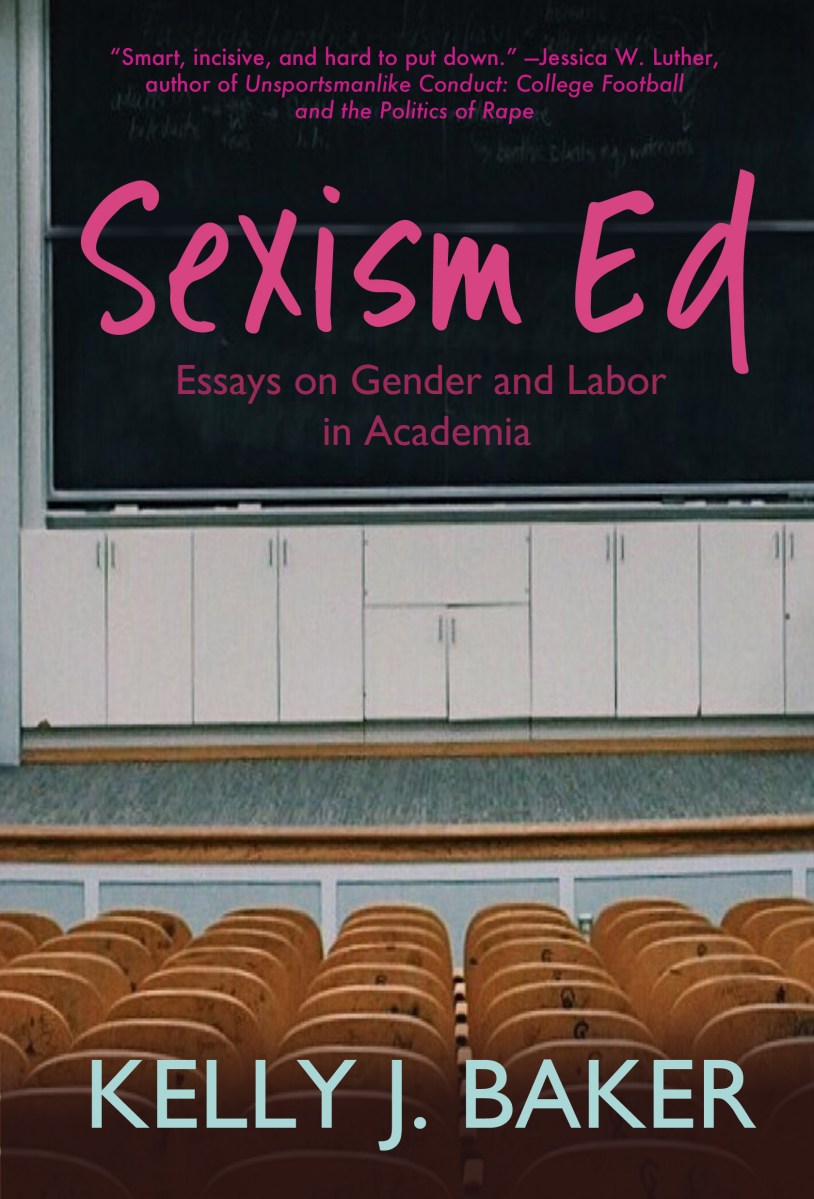Eleven years ago, Kelly Baker—then a graduate student studying how the Ku Klux Klan used religion to appeal to Protestant America in the early 20th century—cold-pitched an eminent scholar about writing for his blog, Religion in American History. The professor said yes, inviting Baker into the then-nascent digital space, where she published her first pieces for a public audience. Now she’s one of the Internet’s most prolific commentators on higher education, religion (especially its intersections in America with race, class, gender, and violence), and sexism. Along with her Ph.D. in religious studies, she’s the editor of Women in Higher Education and the author of four books. Her latest, a collection of essays titled Sexism Ed: Essays on Gender and Labor in Academia, could hardly come at a more opportune time.
Over the last month, new rounds of disclosure surrounding sexual harassment and assault on college campuses by faculty have refocused attention on the many ways that our institutions continue to protect predators. High-profile cases at Harvard University and the University of Rochester, the latter leading to a presidential resignation, are just the tip of a sizable iceberg. A series of essays on being a woman in the academy, published by the Chronicle of Higher Education, reveals layers of discrimination both overt and implicit. None of that is a surprise to Baker, as she applies her humanist’s training to analyze and describe the discrimination she encountered in her own career, while documenting the experiences of others.
Over email, Pacific Standard spoke with Baker about sexism in the academy, her work as a public intellectual, and the craft of essay-writing.

As you started writing for the Chronicle of Higher Education, why did you shift from writing about American religion to focusing on sexism in higher ed?
I was trying to figure out why I hadn’t been able to get a tenure-track professor job after five years on the job market. At first, I thought there was something wrong with me. Maybe my CV/resume sucked, but it didn’t. Maybe I hadn’t taught enough, but I had. Maybe I hadn’t published enough, but I had an award-winning book, articles, and a new book under contract.
I realized that my story of washing out of the academia sounded really familiar to the stories that other women scholars shared with me, so I started digging into studies on bias and sexism in the academy. And man, what I found showed that it wasn’t something wrong with me, but rather that sexism was part of the structure of academia. So I started writing about sexism to show the data about how institutions of higher ed had a gender problem.

(Photo: Raven Books)
Higher ed clearly does, but how, as a writer, do you tease out the sexist aspects of a problem without getting lost in all the other kinds of oppression at work in the academy at the same time?
I write about this some in the introduction of Sexism Ed because I wanted to be up front about my privilege. I’m a white, cis, able woman in a heterosexual partnership with two kids; I grew up working class, but now I’m firmly in the middle class. Most of the time, white women, like me, tend to benefit the most from affirmative action policies.
When I started writing about higher ed, I imagined that the problems I encountered trying to get an academic post were about me as candidate. But when I started to dig into the demographics of who gets jobs, promotion, and tenure, the data showed the impact of sexism compounded by race, ethnicity, sexuality, and parental status. I wasn’t looking for sexism, but I kept finding it.
The more I wrote about sexism in higher ed, the more people (men and women) tried to tell me that sexism wasn’t a problem. It is clear that academia doesn’t just have a sexism problem, but also problems with race, sexuality, ability, class, etc. I focused on sexism because of the pushback that I received for even suggesting there might be an issue.
Can you tell me a bit more about that pushback?
Sure, I received emails, comments, tweets, and messages from academic men, who wanted me to know that sexism wasn’t a problem in academia. They told me about how their universities (or colleges) had women presidents. Or how their departments had a lot of women. Or how there were women in their grad programs. Or how they knew a women academic once. They sent me anecdote after anecdote about how women were doing fine in the academy to tell me that I was wrong. It was bewildering to see so many men try to shout me down for mere mention of a gender problem, which really just seemed to prove my point.
So clearly you’re right that higher ed has a gender problem, but so does the United States. The world! Do you think higher ed has a worse gender problem than other major institutions?
We’re in the moment of #MeToo, with women documenting on social media what it is like to be a woman at work, but also a woman, or girl, in the world. As I read story after story about what women experience—cruelty; harassment; physical, emotional, and sexual violence; and death—it’s hard to not to be overwhelmed by the mundaneness of misogyny in our larger world. And yet, there’s still a question of whether #MeToo will reach and/or change academia.

(Photo: Kelly Baker)
What I think makes the gender problem unique (and maybe worse, but maybe not) in the academy is the assumption that somehow the ivory tower is detached from the common prejudices and biases of the “real” world. When this assumption is paired with the belief that academia is a meritocracy, gender bias and harassment don’t appear as bias and harassment, but rather as stories about how women can’t hack it.
The emphasis on meritocracy overshadows that sexism is a feature of the system, not a bug.
Why is the myth of the meritocracy so hard to stop?
Meritocracy is an appealing idea, right? It’s supposedly a system in which people are judged by their accomplishments, not who they are or where they come from, and those who work hard enough will be rewarded. I get the appeal. I naively believed that academia was a meritocracy for a while too because everyone around me assumed that was how things worked. So many academics refuse to consider that merit isn’t why some people (particular types of people) get ahead and others don’t. Part of me wonders: If the myth of meritocracy was actually punctured for most academics, would the whole system fly off the hinges? The more cynical part of me thinks that meritocracy functions as a cover for the structural sexism and racism of higher ed.
Sexism Ed is a collection of essays, and I want to finish by asking you a bit about essay-writing as a form. How do you understand the relationship between your scholarly self and your role as a public intellectual? What can writing do in the face of big problems like structural sexism?
When I write public-facing essays, I’m always thinking about what I want to change about the world that we inhabit right now. Those kinds of essays are about pointing out a problem, providing evidence of the problem, and, hopefully, thinking of what we can do to fix it or showing what others have done. My public writing, my essays, are about action and coaxing an audience to follow along with me. They are a form of activism.
In many ways, this is how I write and craft scholarly articles too, but I’m writing about the past. I still research both before I write. I still think too long about what I’m trying to accomplish. I figure out my intervention. Being a historian and religious studies scholar shaped how I approach all my writing. I argue in similar ways in both because I tend to be more provocative in my academic work then maybe I should be. It’s more a difference of what I hope a piece of writing can accomplish right now.
What can an essay do? Help us see how the systems of oppression work? Show that sexism is pervasive, especially in workplaces that claim merit? Help change the world a little? I really hope so, which is why I keep writing.
This conversation has been lightly edited and condensed for clarity.



